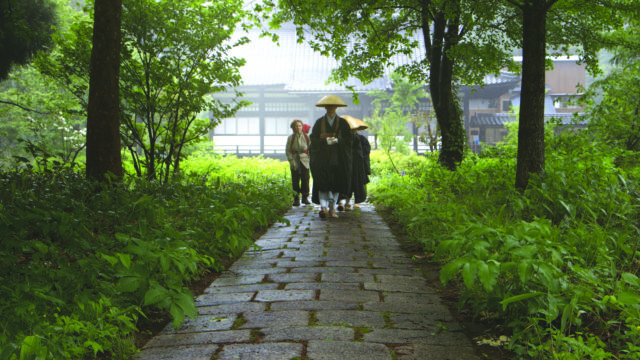
As the reality of summer blockbuster season sets in, a simple truth becomes all too clear: Moviegoing can be quite stressful. Death and destruction abound on the silver screen, sometimes from monsters raging for alpha dominance, other times from mutants and space warlords who can eradicate our very existence with the snap of their fingers. Sometimes it’s even a jacked-up former pro-wrestler who can pull helicopters from the sky. Not even children’s movies offer sanctuary, what with that hyperactive bunny in the superhero suit yelling at everyone and everything. Why does going to the movies have to be this anxiety-inducing?
Thankfully, some movies can function as counter-programming, a tonic for all that sound and fury emanating from the multiplex. Zen for Nothing is such a movie: 100 minutes of stillness, calm, peace and, if you’re lucky, a little enlightenment.
Directed by Swiss filmmaker Werner Penzel, Zen for Nothing takes place in a small Antaji Zen monastery on Japan’s western coast, though you wouldn’t know that from the movie — there is little context about the monastery and the German-born man who runs it, Abbot Muhō. Our main character, if the movie has one, is Sabine Timoteo, an actress from Switzerland who has come to join the monastery for an indefinite amount of time.
The monks welcome Timoteo, and she learns the procedures and rituals of the monastery on the job. But there is no pretense to this process. In one instance, Timoteo is so transfixed by her egg roll she fails to notice that everyone around the table has assumed a posture of prayer. A companion gently nudges her, smiles and she gets it. She gently puts down her bowl and chopsticks, and the prayer begins. No monk admonishes her for lack of attention; no Roman Catholic strictures are handed down. Just patience.
Watching Zen for Nothing also requires patience, but once you fall into the movie’s rhythm, you’ll be just fine. The camera barely moves, the soundtrack is negligible and we learn little of the people at the monastery. But you realize you don’t need it about halfway through.
Penzel also peppers the movie with quotes from an early 20th century Antaiji abbot, Kodo Sawaki. With a movie this lean on exposition, each quote explodes with significance. These quotes address the contradictory nature of Zen, some humorously, some challengingly. The best ones are the riddles.
Zen For Nothing is not a movie for everyone. The press notes describe the movie as a documentary, but you could easily watch it as a scripted narrative. It is an immersive experience, one that suggests much and answers little. If you are going to see it, do so in a darkened theater where distractions are minimal. You might find something that soothes rather than stimulates, relaxes rather than riles. Who knows, you may even find yourself looking around for a monastery afterward. Every pilgrimage has to start somewhere.
ON THE BILL: ‘Zen For Nothing.’ June 12–15, Dairy Arts Center, The Boedecker Theater, 2590 Walnut St., Boulder, 303-440-7825, thedairy.org














